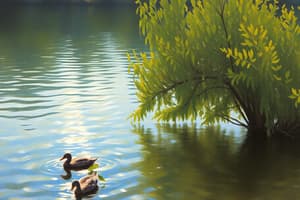Podcast
Questions and Answers
What is the boiling point of water under normal pressure?
What is the boiling point of water under normal pressure?
- 50°C
- 100°C (correct)
- 0°C
- 200°C
Which type of water is referred to as being free from chemical poisons and infectious diseases?
Which type of water is referred to as being free from chemical poisons and infectious diseases?
- Rain water
- Polluted water
- Contaminated water
- Pure water (correct)
What is the main characteristic of rain water?
What is the main characteristic of rain water?
- It is colorless and tasteless.
- It is always safe for consumption.
- It may contain some dissolved gases. (correct)
- It contains high levels of minerals.
Which type of water is characterized by changes in its physical characteristics due to contamination?
Which type of water is characterized by changes in its physical characteristics due to contamination?
What describes surface water?
What describes surface water?
Which characteristic is associated with underground water compared to surface water?
Which characteristic is associated with underground water compared to surface water?
Which of the following sources of water is considered to be soft water?
Which of the following sources of water is considered to be soft water?
What happens to rain water that causes it to contain acidity?
What happens to rain water that causes it to contain acidity?
What makes groundwater harder than surface water?
What makes groundwater harder than surface water?
What criteria must water meet to be considered suitable for potable use?
What criteria must water meet to be considered suitable for potable use?
Why must water samples be collected in inert materials?
Why must water samples be collected in inert materials?
What should be done before collecting water samples from distribution systems?
What should be done before collecting water samples from distribution systems?
Which aspect of water must be avoided for it to be suitable for irrigation purposes?
Which aspect of water must be avoided for it to be suitable for irrigation purposes?
What method is recommended for collecting samples from a river or stream?
What method is recommended for collecting samples from a river or stream?
What is a requirement for industrial water use?
What is a requirement for industrial water use?
What is the main reason for ensuring water is free from infectious diseases?
What is the main reason for ensuring water is free from infectious diseases?
Study Notes
Properties of Water
- Clear, transparent, tasteless, and odorless fluid.
- Colorless in small amounts, appearing pale blue in deeper columns.
- Freezes at 0°C and boils at 100°C under normal pressure.
- Greatest density occurs at 4°C.
- Excellent solvent, capable of dissolving nearly all substances, including solids, liquids, and gases.
Classification of Water
According to Purity
- Pure Water: Free from chemical poisons and infectious diseases; safe for human consumption.
- Polluted Water: Undergoes changes in physical characteristics like color, odor, and turbidity due to contaminants.
- Contaminated Water: Contains animal and human wastes, potential carriers of infectious diseases and chemical poisons (e.g., Pb²⁺, As₅⁺).
According to Sources
-
Rain Water:
- Purest type, akin to distilled water, may have dissolved gases (O₂, NH₃, N₂, CO₂).
- Can be acidic due to CO₂ and nitrous oxides, which can be removed by boiling.
- May contain inorganic constituents (e.g., NaCl from ocean spray) and H₂SO₄ from SO₂ oxidation.
- Soft water; free from Ca²⁺ and Mg²⁺, but may have micro-organisms from the air.
-
Surface Water:
- Includes rivers, canals, lakes, and ponds.
- Exposed to contamination from dust, soil, sewage, and waste.
- Contains dissolved solids, CO₂, and organic acids.
- Home to pathogenic bacteria.
-
Underground Water:
- Forms when surface water percolates through soil.
- Generally purer and less polluted due to filtration.
- Contains higher concentrations of dissolved Ca²⁺ and Mg²⁺, making it harder than surface water.
- More acidic due to increased CO₂ from organic decomposition, and can contain medicinal sulphur.
According to Uses
- Potable Water: Must be clear, colorless, odorless, neutral, and free from chemical poisons and infectious diseases.
- Irrigation Water: Should be soft to avoid damaging soil and fibers in the textile industry.
- Industrial Water: Must be pure and free from chemical damage during use.
- Pharmaceutical Water: Omits chemical poisons, must be pyrogen-free.
Sampling of Water
- Representative samples should be collected in inert materials (e.g., boro-silicate glass, hard rubber).
- For distribution systems, flush lines adequately before collection.
- Collect samples from wells only after sufficient pumping.
- For rivers or streams, samples should be taken from top to bottom, ideally at the center of the stream.
Studying That Suits You
Use AI to generate personalized quizzes and flashcards to suit your learning preferences.
Related Documents
Description
This quiz covers the fundamental properties of water, including its physical characteristics and classifications based on purity and uses. Explore how water behaves at different temperatures and its role as a solvent. Test your understanding of these essential concepts in chemistry.




